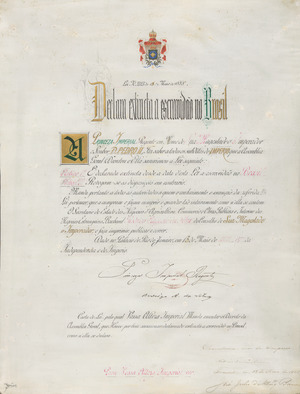Lei Áurea facts for kids
Quick facts for kids Lei ÁureaGolden Law |
|
|---|---|

Manuscript of the Lei Áurea
Brazilian National Archives |
|
| Law No. 3,353 of 13 May 1888 | |
| Territorial extent | Empire of Brazil |
| Enacted by | General Assembly of the Empire of Brazil |
| Date passed | 12 May 1888 |
| Date enacted | 13 May 1888 |
| Signed by | Isabel, Princess Imperial of Brazil |
| Introduced by | Rodrigo Augusto da Silva |
| Summary | |
| Declares slavery extinct in Brazil. | |
The Lei Áurea (which means Golden Law in Portuguese) was a very important law in Brazil. It was officially Law No. 3,353 and was signed on May 13, 1888. This law made slavery illegal in Brazil forever. It was signed by Isabel, Princess Imperial of Brazil, who was against slavery. She was acting as the ruler because her father, Emperor Pedro II of Brazil, was traveling in Europe.
The Golden Law was not the first step to end slavery in Brazil. Before it, there was the Rio Branco Law of September 28, 1871. This law was also called "the Law of Free Birth." It meant that all children born to enslaved parents would be free. Later, the Saraiva-Cotegipe Law (known as "the Law of Sexagenarians") was passed on September 28, 1885. This law freed enslaved people when they turned 60 years old. Brazil was the last country in the Western world to officially end slavery.
Why Slavery Ended
Many things led to the Golden Law being signed. People called abolitionists worked very hard to end slavery. They spoke out and organized protests.
Slavery was also becoming less profitable for some landowners. It was sometimes cheaper to pay European immigrants for their work. These immigrants often worked in difficult conditions. Also, fewer new enslaved people were arriving in Brazil. All these reasons helped push for the end of slavery.
What the Law Said
The text of the Golden Law was very short and clear. It had only two articles:
Art. 1.º: É declarada extinta desde a data desta lei a escravidão no Brasil.
Art. 2.º: Revogam-se as disposições em contrário.
(Article 1: From the date of this law, slavery is declared extinct in Brazil.
Article 2: All dispositions to the contrary are revoked.)
This simple text meant that slavery was immediately ended across all of Brazil. It also canceled any older laws that supported slavery.
Related Topics
- Thirteenth Amendment to the United States Constitution
- Emancipation Proclamation
- Post-abolition in Brazil
 | John T. Biggers |
 | Thomas Blackshear |
 | Mark Bradford |
 | Beverly Buchanan |

